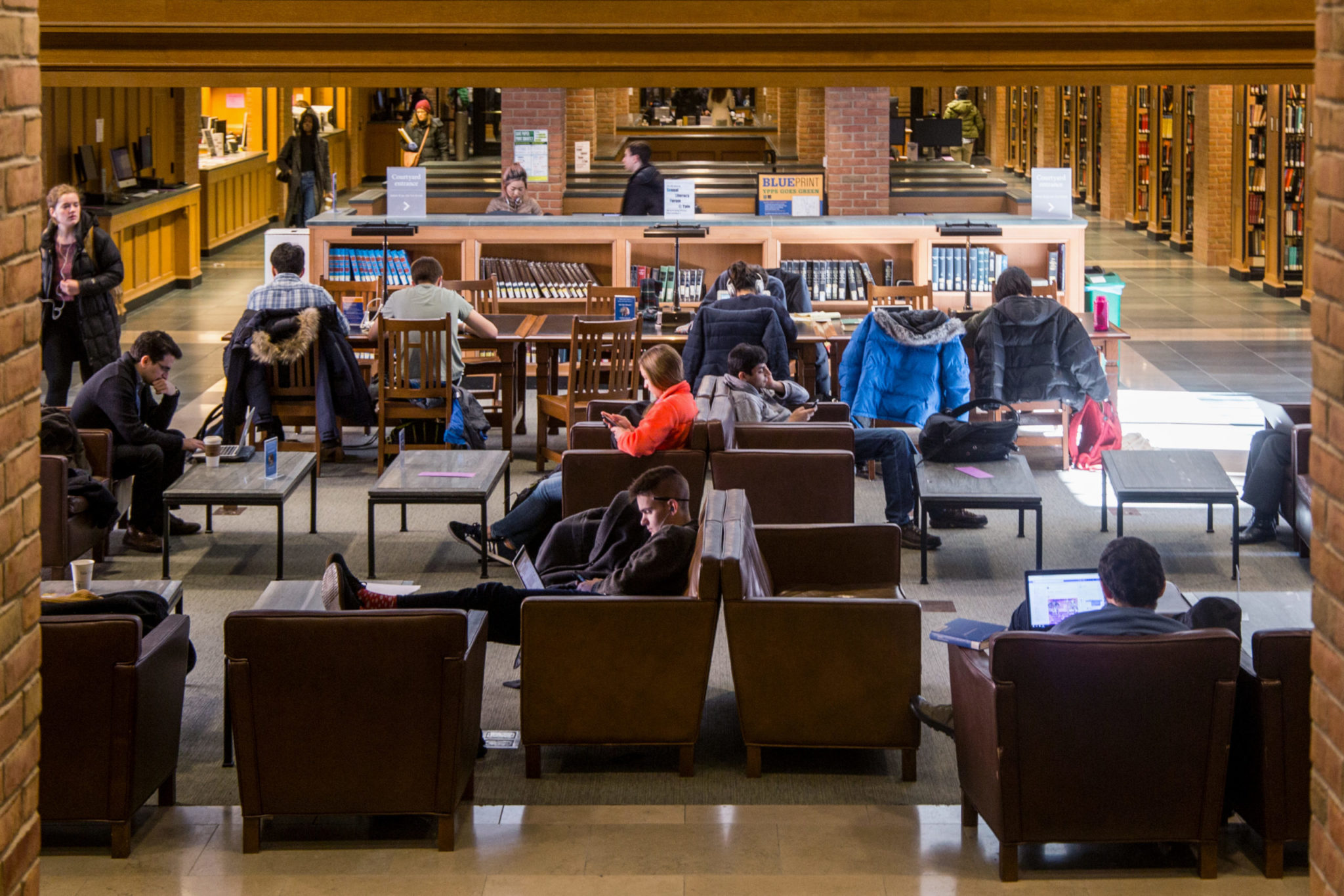Students continue to report WiFi troubles despite “dramatically enhanced” network standards
Yale’s Next Generation Network project is well underway, but improvements claimed by the University do not appear to have impacted user experience.

Lucas Holter, Senior Photographer
Hannah Nashed ’26 was in the middle of completing a timed online quiz for class when the Wi-Fi crashed, causing her to lose her place in the assignment.
Her problem likely sounds familiar for those who regularly work online in campus spaces. Nashed was one of 15 students who described consistent trouble accessing internet connection on campus in interviews with the News.
“I have experienced WiFi problems pretty much everywhere,” Nashed said. “It’s particularly bad outside of Sterling [Memorial Library] and on the bottom floor of Bass. WiFi problems have remained unchanged throughout the year.”
The University is in the middle of a five-year construction project aimed at modernizing its outdated WiFi infrastructure across all University campus spaces.
The project, dubbed Next Generation Network, was first approved by the Yale Corporation in 2019 and has already seen its core network components installed. Infrastructural transitions across campus buildings are expected to continue through 2024.
“It is important to recognize that we have a very complex campus, with architecture that in many areas isn’t very friendly to WiFi,” Vice President for Information Technology and Chief Information Officer John Barden told the News. “Thick stone walls limit range and coverage of WiFi and cellular, and often require augmentation to support our growing uses across campus.”
Barden added that Yale IT has not received “materially greater reported WiFi issues” this year. He said that Yale IT tracks and responds to network issues when students contact its Help Desk.
But many WiFi issues go unreported: none of the students interviewed said they had tried reporting issues to the Help Desk.
Mimi Papathanasopoulos ’26 said that she has not reported WiFi troubles to the Help Desk because issues, while frequent, are usually short-term. Because WiFi is necessary for so many day-to-day activities, students are forced to circumvent these issues quickly and on their own.
“It’s really annoying sometimes because I have to move study locations to get better WiFi,” Papathanasopoulos said. “Or I have to use my hotspot from my phone, which is hard because I don’t have unlimited data.”
Yale currently offers two main WiFi networks: YaleSecure and YaleGuest. While YaleGuest provides more limited connection for “guests of the University only,” YaleSecure is the “recommended, encrypted wifi network” for Yale faculty, students and staff.
The NGN project seeks to provide a “more reliable and secure” network, according to their website, by overhauling 400 telecom closets in 350 buildings, creating three new network aggregation data centers and replacing over 7,500 wireless access points.
The University did not disclose how much it has spent on the NGN project and related network services.
Papathanasopoulos told the News that while she understands that the University is in the process of updating its network, unreliable WiFi is “incredibly inconvenient” for students. She also commented that WiFi quality has seemed to worsen throughout the academic year.
“Recently, I’ve noticed that in certain important study places like Bass Library, [the WiFi] is working less as the school year has gone on,” Papathanasopolous said. “Especially on my phone, I feel like I have trouble connecting to YaleSecure, so I often have to use YaleGuest or connect to a personal hotspot.”
Students experienced elevated network difficulties during the month of September, when several days-long disruptions plagued Yale’s network. Barden called these September disruptions “brief but significant” — one was due to an electrical malfunction, and the other was due to extensive flooding after a storm on Sept. 6.
Barden acknowledged that these incidents were “extremely disruptive” to student life. However, Barden claims the disruptions have been fully resolved. The University will perform a network test over the winter recess to confirm the success of repairs.
The COVID-19 pandemic has also hindered progress on the NGN project, further protracting student WiFi issues.
“The network replacement project has been impacted by the global supply chain issues affecting all electronics manufacturing,” Barden told the News.
According to Barden, Yale’s equipment vendor is experiencing a significant backlog, which has delayed NGN’s rollout. Because of these holdups, Barden does not anticipate the NGN transition to finish until 2024.
Meanwhile, some students are calling on the University to speed up the process.
“Yale needs to prioritize fixing WiFi and network issues in order for students to be as successful and happy as possible,” Sofia Jacobson ’26 told the News. “I have experienced WiFi troubles throughout the year. … Sometimes when I am eager to get my work done, the WiFi just suddenly goes out for no apparent reason.”
According to a progress map on the NGN project website, the vast majority of buildings on campus have not been updated with the new network technology, nor are they in the process of being updated.
The University seems to have prioritized facilities on the Yale School of Medicine campus. Central campus and Science Hill — where most Yale College students live and work — appear almost totally untouched on the map.
WiFi technology originates from a 1985 ruling by the U.S. Federal Communications Commission that allowed the 900 MHz, 2.4 GHz and 5.8 GHz bands of the radio spectrum to be used without a license.







